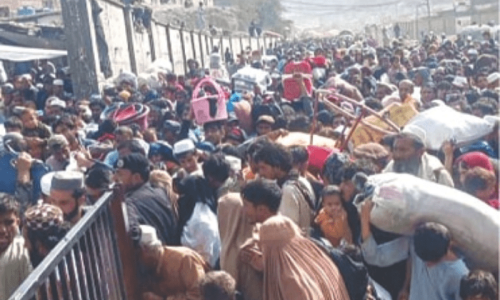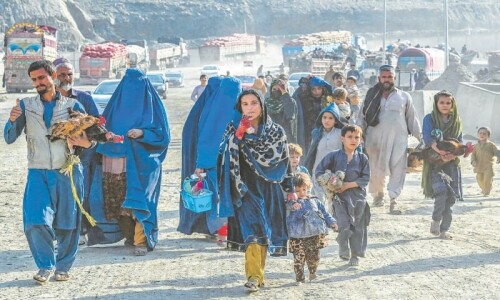KARACHI: Sadiq, an ethnic Hazara, fled Afghanistan last year because he was attacked and beaten by the members of the Taliban regime. Now, the 25-year-old faces expulsion from Pakistan and he fears a return to his home country could amount to a death sentence.
“Going to Kabul would be like going to a graveyard to be buried,” he said, recalling how the Taliban had stormed his house in the Afghan capital and abducted him to find out the location of other family members, who had worked for the previous government.
“I fear they will … kill me this time for running away. They have their eyes on me,” he said.
Sadiq, who lives in Karachi with his family, said he had made no preparations to leave as he could see no future in Afghanistan.
Proposed deportation stokes anxiety among Afghan journalists, academics and rights activists, who fled Taliban rule
Many Afghans fear deportation to their native land, where human rights are in a state of collapse, but the risks are particularly high for Hazaras like Sadiq.
The predominantly Shia community has faced decades of persecution by the hardline Taliban.
“Genocide of Hazaras in Afghanistan is still going on. The Taliban are trying to take the Hazara areas in Afghanistan under various pretexts,” said Amir, a Hazara in Kabul who declined to give his full name.
Hazara families have been evicted from their homes and farms by the Taliban, in many cases with only a few days’ notice, and without any chance to prove their legal claims, residents and rights campaigners say.
“No Hazara is safe here and there is no guarantee that the majority of Hazaras who return to Afghanistan will not be killed,” said Amir, 28, who abandoned his dream job as a singer-musician after facing constant abuse from the Taliban. He works as a marketer in a small company now.
“Life is like hell,” he said, adding that his wife, a women’s rights activist, had given up her job to stay at home. Afghanistan’s Taliban rulers, however, have termed Islamabad’s deportation plan “unacceptable”, arguing that Afghans are not responsible for security threats.
“How can Afghan refugees be sent back forcefully and on such a short notice?” Taliban spokesman Suhail Shaheen asked. But Pakistan is not much safer, Hazaras say.
Without valid visas or proper identification cards, Hazara families are forced to live under the radar.
They say the situation has become worse since the repatriation plans were announced. Many have been arrested or forced to pay bribes, while others lost their jobs overnight or were kicked out by their landlords.
“It has not been easy to find work because without ID cards nobody gives you work,” said Kemya, a widow and mother-of-four, who moved to Karachi after the Taliban killed her husband last year.
Although Pakistan insists the deportation process will be orderly and conducted in phases, possibly beginning with people with criminal record, Heather Barr of Human Rights Watch said the plan was “alarming”, and not just for Hazaras.
“It’s left people feeling very much stuck between a rock and a hard spot,” she said, adding that Afghan LGBTQ+ refugees were also in a “truly terrible situation because there is no way that they can live safely under the Taliban but they are also not safe in Pakistan”.
The proposed mass expulsion has also stoked anxiety among Afghan journalists, judges, academics, and civil rights activists, who fled the Taliban.
Women too are at risk. UN High Commissioner for Human Rights Volker Turk said last month that women and girls face a “shocking level of oppression” in Afghanistan.
Published in Dawn, October 30th, 2023















































Dear visitor, the comments section is undergoing an overhaul and will return soon.